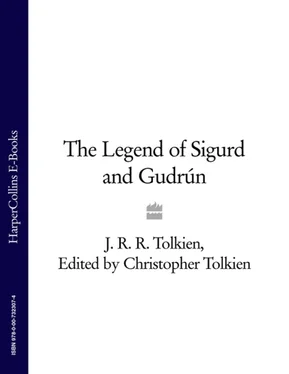J. Tolkien - The Legend of Sigurd and Gudrún
Здесь есть возможность читать онлайн «J. Tolkien - The Legend of Sigurd and Gudrún» — ознакомительный отрывок электронной книги совершенно бесплатно, а после прочтения отрывка купить полную версию. В некоторых случаях можно слушать аудио, скачать через торрент в формате fb2 и присутствует краткое содержание. Жанр: Старинная литература, на английском языке. Описание произведения, (предисловие) а так же отзывы посетителей доступны на портале библиотеки ЛибКат.
- Название:The Legend of Sigurd and Gudrún
- Автор:
- Жанр:
- Год:неизвестен
- ISBN:нет данных
- Рейтинг книги:5 / 5. Голосов: 1
-
Избранное:Добавить в избранное
- Отзывы:
-
Ваша оценка:
- 100
- 1
- 2
- 3
- 4
- 5
The Legend of Sigurd and Gudrún: краткое содержание, описание и аннотация
Предлагаем к чтению аннотацию, описание, краткое содержание или предисловие (зависит от того, что написал сам автор книги «The Legend of Sigurd and Gudrún»). Если вы не нашли необходимую информацию о книге — напишите в комментариях, мы постараемся отыскать её.
The Legend of Sigurd and Gudrún — читать онлайн ознакомительный отрывок
Ниже представлен текст книги, разбитый по страницам. Система сохранения места последней прочитанной страницы, позволяет с удобством читать онлайн бесплатно книгу «The Legend of Sigurd and Gudrún», без необходимости каждый раз заново искать на чём Вы остановились. Поставьте закладку, и сможете в любой момент перейти на страницу, на которой закончили чтение.
Интервал:
Закладка:
The Æsir asked Hreidmar for lodging for the night, saying that they had enough food with them, and they showed Hreidmar their catch; but the otter was Hreidmar’s son Otr, who took the form of an otter when he was fishing (the name Otr and the Norse word otr ‘otter’ being of course the same). Then Hreidmar called out to his other sons, Fáfnir and Regin, and they laid hands on the Æsir and bound them, demanding that they should ransom themselves by filling the otter-skin with gold, and also covering it on the outside with gold so that no part of it could be seen.
Here the prose versions separate. According to Snorri (who had not previously mentioned Andvari) Ódin now sent Loki to Svartálfaheim, the Land of the Dark Elves; it was there that he found the dwarf Andvari who was ‘as a fish in the water’, and Loki caught him in his hands. In the Saga, on the other hand, Loki’s errand was to seek out Rán, the wife of the sea-god Ægir, and get from her the net with which she drew down men drowning in the sea; and with that net he captured the dwarf Andvari, who was fishing in his falls in the form of a pike. This is the story that my father followed (stanza 7).
Andvari ransomed himself with his hoard of gold, attempting to keep back a single little gold ring; but Loki saw it and took it from him (stanza 9). In Snorri’s account only, Andvari begged to keep the ring because with it he could multiply wealth for himself, but Loki said that he should not have one penny left.
Andvari declared that the ring would be the death of any who possessed it, or any of the gold. According to Snorri, ‘Loki said that this seemed very well to him, and he said that this condition should hold good, provided that he himself declared it in the ears of those who should receive the ring.’ Then Loki returned to Hreidmar’s house, and when Ódin saw the ring he desired it, and took it away from the treasure. The otter-skin was filled and covered with the gold of Andvari, but Hreidmar looking at it very closely saw a whisker, and demanded that they should cover that also. Then Ódin drew out Andvari’s ring ( Andvaranaut , the possession of Andvari) and covered the hair. But when Ódin had taken up his spear, and Loki his shoes, and they no longer had any need to fear, Loki declared that the curse of Andvari should be fulfilled. And now it has been told (Snorri concludes) why gold is called ‘Otter’s ransom’ (otrgjöld) or ‘forced payment of the Æsir’ (nauðgjald ásanna) : see p.36.
An important difference between the two prose versions is that Snorri began his account of the Völsung legend with ‘Andvari’s Gold’, whereas in the Saga this story is introduced much later, and becomes a story told by Regin (son of Hreidmar) to Sigurd before his attack on the dragon. But although my father followed Snorri in this, he nonetheless followed the Saga in giving a brief retelling of ‘Andvari’s Gold’ by Regin to Sigurd in the fifth section of the poem, with a number of verse-lines repeated from their first occurrence (see V.7–11).
1 Of all the Northern divinities Loki is the most enigmatic; ancient Norse literature is full of references to him and stories about him, and it is not possible to characterize him in a short space. But since Loki only appears here in these poems, and in my father’s words concerning him given on p.54, it seems both suitable and sufficient to quote Snorri Sturluson’s description in the Prose Edda:
‘Also counted among the Æsir is Loki, whom some call the mischief-maker of the Æsir, the first father of lies, and the blemish of all gods and men. Loki is handsome and fair of face but evil in his disposition and fickle in his conduct. He excels all others in that cleverness which is called cunning, and he has wiles for every circumstance. Over and over again he has brought the gods into great trouble, but often got them out of it by his guile.’
In this stanza he is called ‘lightfooted Loki’, and in Snorri’s version of the story of Andvari’s Gold it is said, as already noted, that after the payment of the ransom to Hreidmar Ódin took up his spear ‘and Loki his shoes’. Elsewhere Snorri wrote of ‘those shoes with which Loki ran through air and over water’.
Of the god Hoenir no more is said in the Lay than that while Loki went on the left side of Ódin, Hœnir went on his right. In my father’s somewhat mysterious interpretation given on p.54 (iv) he calls the companion of Ódin who walks on his right hand ‘a nameless shadow’, but this must surely be Hœnir, or at least derived from him. However, if there is no end to what is told of Loki in the Norse mythological narratives, very little can now be said of Hœnir; and to my understanding, there is nothing in the vestiges that remain that casts light on the ‘nameless shadow’ that walks beside Ódin.
6 Ásgard is the realm of the Gods (Æsir).
7 Rán: the wife of the sea-god Ægir; see p.189.
8 ‘I bid thee’: I offer thee.
13–15 In these concluding stanzas the references to the hope of Ódin, and Ódin’s choice, have of course no counterparts in the Norse texts.
II SIGNÝ
This is a rendering in verse of elements of the narrative of the earlier chapters of the Völsunga Saga. No old poetry recounting or referring to this story exists apart from a single half-stanza (see the note to stanzas 37–39), but this section of the Lay of the Völsungs can be seen as an imagination of it. It is a selection of moments of dramatic force, and many elements of the prose Saga are omitted; in particular the most savage features of the story are eliminated (see notes to stanzas 30–32, 37–39).
The Gauts of the headnote to this section are the Gautar of Old Norse, dwelling in Gautland, a region of what is now southern Sweden, south of the great lakes. The name Gautar is historically identical with the Old English Geatas , who were Beowulf’s people.
1–2 These two stanzas are an extreme reduction of the opening chapters of the Saga which tell of Völsung’s immediate ancestry in a prosaic fashion: my father clearly found this unsuited to his purpose.
2 ‘child of longing’: Rerir’s wife was for long barren.
4 In the Saga the tree in the midst of King Völsung’s hall is named the Barnstock, and is said to have been an apple-tree.
7 ‘Birds sang blithely’: the birds were sitting in the boughs of the great tree that upheld the hall; so again in stanza 11, and see III.2.
10 King Siggeir and many other guests came to the wedding feast held in King Völsung’s hall.
12–13 In the Saga the old man is described in terms that make it plain that he was Ódin, but he is not named. Here in the Lay he is Grímnir ‘the Masked’, a name of Ódin that does not appear at all in the Saga but is derived from the Eddaic poem Grímnismál.
The ‘standing stem’ in 13 line 3 is the trunk of the Barnstock, into which Ódin thrust the sword.
14 ‘Gaut and Völsung’: Völsung’s children and race are often called Völsungar , Völsungs, as in the name of the Saga, and in the head-note to this section.
16 This was the beginning of hatred and the motive for Siggeir’s attack on Völsung and his sons when they came to Gautland as his guests (21–23); Siggeir was enraged at Sigmund’s answer, but (in the words of the Saga) ‘he was a very wily man, and he behaved as if he were indifferent’.
‘bade’: offered (so also ‘I bid thee’ in I.8); ‘boon’: request.
17–22 It is told in the Saga that on the day following the night of the wedding feast (‘last night I lay / where loath me was’, 19) Siggeir left very abruptly and returned with Signý to Gautland, having invited Völsung and his sons to come as his guests to Gautland three months later (21). Signý met them when they landed to warn them of what Siggeir had prepared for them (22), but (according to the Saga) Völsung would not listen to Signý’s entreaty that he return at once to his own land, nor to her request that she should be allowed to stay with her own people and not return to Siggeir.
Читать дальшеИнтервал:
Закладка:
Похожие книги на «The Legend of Sigurd and Gudrún»
Представляем Вашему вниманию похожие книги на «The Legend of Sigurd and Gudrún» списком для выбора. Мы отобрали схожую по названию и смыслу литературу в надежде предоставить читателям больше вариантов отыскать новые, интересные, ещё непрочитанные произведения.
Обсуждение, отзывы о книге «The Legend of Sigurd and Gudrún» и просто собственные мнения читателей. Оставьте ваши комментарии, напишите, что Вы думаете о произведении, его смысле или главных героях. Укажите что конкретно понравилось, а что нет, и почему Вы так считаете.












